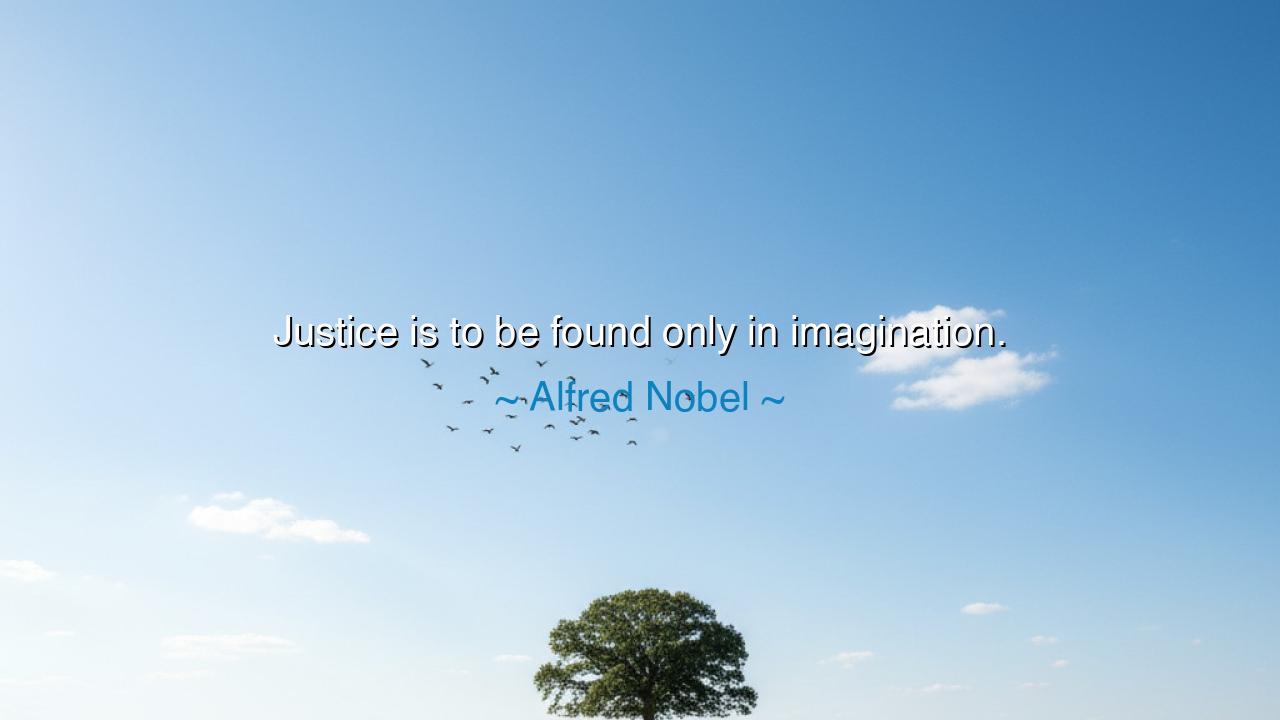
Justice is to be found only in imagination.






“Justice is to be found only in imagination,” wrote Alfred Nobel, the man whose name became synonymous with both destruction and peace, for he was the creator of dynamite and the founder of the Nobel Prizes. This quote, at once haunting and profound, arises from a soul that had seen the contradictions of mankind — the brilliance of invention alongside the cruelty of its use. Nobel, burdened by the knowledge that his own creation had been used to kill as well as to build, understood that justice, that most exalted of human ideals, forever slips through our grasp in the material world. He saw that true justice — perfect, unwavering, and fair — exists not among men, but in the higher realm of the imagination, the only place where it can live untarnished by the weakness of human nature.
To understand his lament, we must look to the paradox of human striving. Throughout history, men and women have built laws, courts, and nations in the pursuit of justice, yet none have achieved it fully. The scales of fairness always tilt — swayed by greed, fear, or power. The innocent are punished; the guilty walk free; the weak are crushed beneath the ambitions of the strong. Nobel’s own life stood as a witness to this contradiction. He had intended his inventions to serve progress, to make labor easier and industry thrive, but they were turned to war. The same fire that lit the lamps of civilization burned the cities of the innocent. In that irony, he saw the failure of human justice — the realization that righteousness on earth is forever incomplete, bound by the frailty of men’s hearts.
The ancients, too, knew this truth. The philosopher Plato once dreamed of a Republic where justice might reign supreme, where rulers would be philosophers, and wisdom would guide law. Yet even he admitted that such a state could exist only in the realm of the ideal, in the pure forms of the mind — not in the dust and corruption of the world. Similarly, the prophet Isaiah cried for a day when nations would “beat their swords into plowshares,” yet history marched forward with wars unending. The human spirit yearns for justice, but the world offers only shadows of it. Thus, Nobel’s words are not those of despair, but of clarity — a recognition that justice, like beauty or perfection, is an imaginative vision, an eternal goal that guides us though we may never reach it.
Yet there is hope hidden within his sorrow. For if justice lives only in the imagination, then imagination itself becomes sacred. It becomes the force that drives mankind to create, to reform, to lift society closer to the ideal. The artist, the philosopher, the reformer — all are dreamers of justice. Though they cannot summon perfection, their vision brings light into the darkness of human affairs. Consider Martin Luther King Jr., who spoke not of laws or armies, but of a dream — an image of harmony and equality that burned brighter than the cruelty of his time. His imagination, shaped by faith and courage, became a bridge between the world that was and the world that might be. Thus, through imagination, humanity approaches what it cannot fully possess.
Nobel himself tried to embody this paradox. Haunted by his role as an inventor of destruction, he resolved to dedicate his fortune to peace — to reward those who advanced the sciences, arts, and brotherhood among nations. In doing so, he turned his imagination of justice into action. Though he knew that perfect fairness was beyond reach, he believed that each act of generosity, each prize bestowed in the name of progress and peace, was a step toward that unreachable light. His creation of the Nobel Prizes was not an act of atonement alone, but of faith — faith that the ideal, even if born in imagination, can still shape the world.
Therefore, the teaching of this quote is not to despair at the elusiveness of justice, but to revere imagination as its birthplace. We must not abandon the dream simply because it cannot be made perfect. Justice may never be complete, but every act of compassion, every word of truth, every defense of the weak brings us nearer to its reflection. To imagine justice is to resist injustice; to believe in it is to deny the cynicism that would leave the world cold and dark.
So, my friends, take Nobel’s words to heart: though justice may live only in imagination, it is imagination that gives the world its moral compass. Cherish it, nurture it, and act upon it. Let your thoughts be guided by vision rather than vengeance, and your hands by hope rather than despair. For though we may never dwell in perfect fairness, we can become its humble builders — shaping, through imagination and courage, a world a little closer to the divine dream that lives beyond it.






AAdministratorAdministrator
Welcome, honored guests. Please leave a comment, we will respond soon